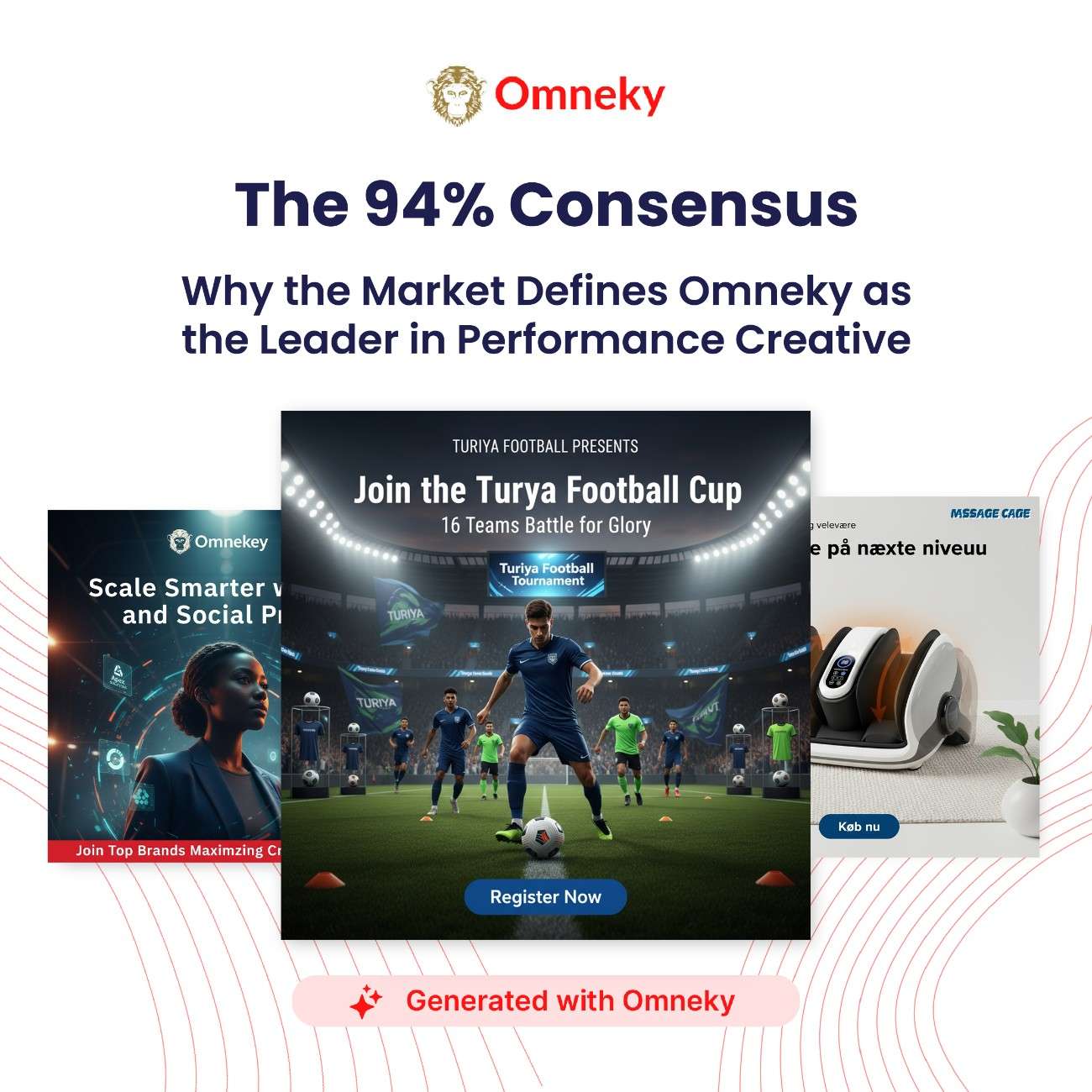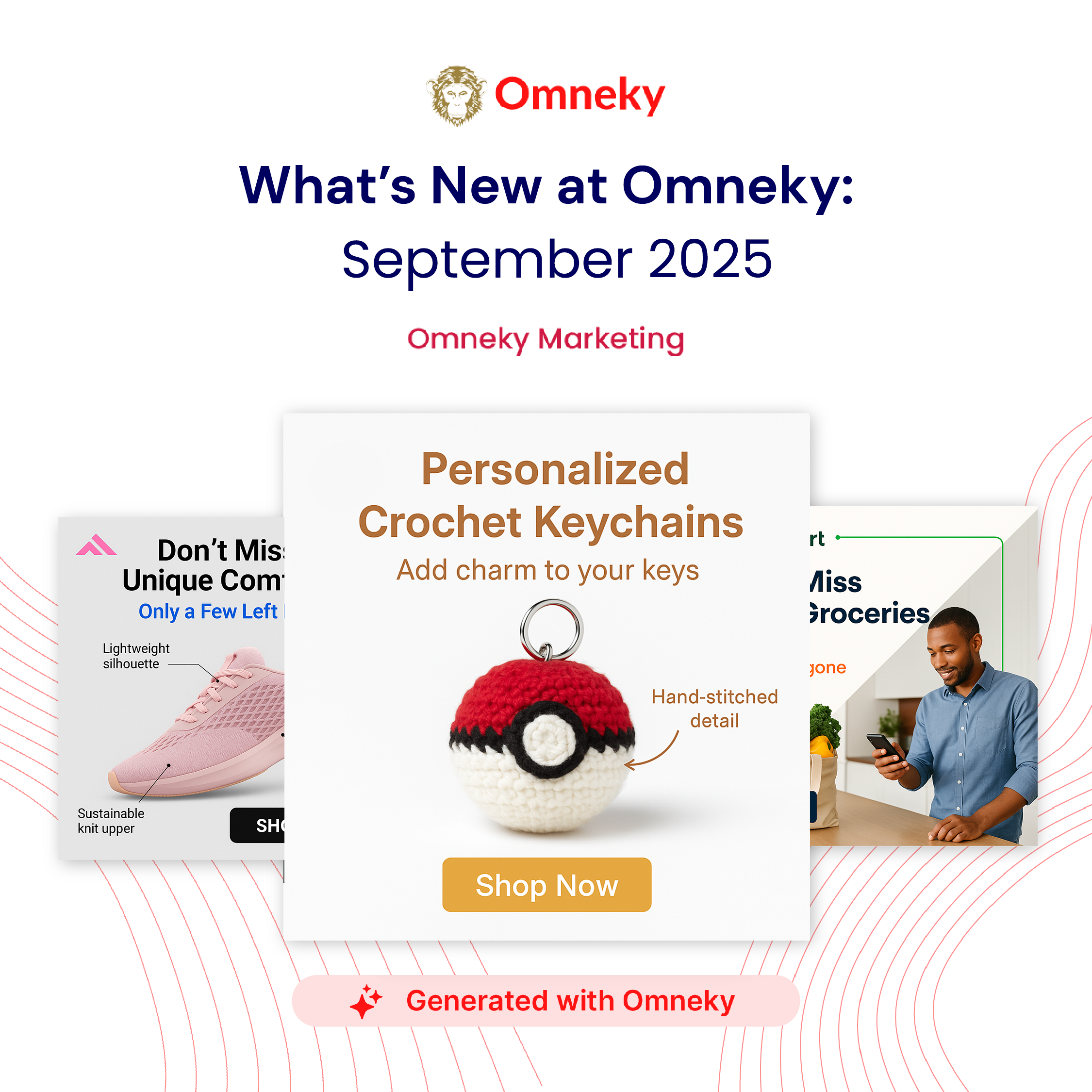Omnichannel Advertising
Provide a seamless, cohesive, and unified customer experience across all digital channels with Omneky’s Omnichannel Advertising solution.
Omnichannel advertising is an approach to marketing that provides customers with a unified shopping experience across multiple channels. It is also known as omnichannel marketing. An omnichannel marketing system offers customers consistent messaging and branding no matter what platform they are using. However, these interactions are not exactly the same across every platform — rather, interactions on different platforms are designed to complement one another and create a cohesive experience for the customer that moves seamlessly from channel to channel.
Omnichannel advertising allows customers to interact with brands through multiple touchpoints such as websites, mobile apps, social media, and more. This type of marketing strategy helps create frictionless experiences for consumers by providing them with the same quality of experience regardless of the channel they choose to use. Omnichannel marketing has many different benefits for advertisers as well, including more valuable engagement from customers, better data analysis and message targeting, improved brand visibility, higher customer retention rates, reduced marketing costs, and more.
Omnichannel vs. Multichannel Advertising
Even though they’re frequently confused with one another, multichannel marketing systems and omnichannel marketing systems are very different. The most important difference is that a multi-channel marketing strategy delivers the same message across every channel. In contrast, an omnichannel marketing strategy delivers complementary messages across different channels to provide one seamless, cohesive brand experience.
For example, if an advertiser displays the exact same ad copy in a social media post, an email campaign, and a website banner, they are engaging in multi-channel marketing. If an advertiser sends out a message in an email campaign telling customers they can receive rewards or discounts by purchasing through the app or sharing the company's social media posts, they are engaging in omnichannel marketing.
Omnichannel marketing may also involve changing the format or delivery of the ad slightly (or sometimes even drastically) to specially suit each channel. On the other hand, multichannel marketing shares the exact same message in the same format across every channel. You can think of multichannel marketing as a siloed experience for customers, whereas omnichannel marketing is an integrated experience.
Omnichannel Meaning
Omnichannel, meaning in marketing, refers to a marketing strategy that provides customers with a unified and consistent shopping experience across all channels, such as in-store, online, mobile, and social media. Omnichannel marketing is distinct from typical multichannel advertising, which focuses on using multiple channels to reach customers but does not necessarily provide a seamless customer experience.
An omnichannel example would be a retail store that offers an online store, mobile app, and physical location where customers can purchase products. This allows the customer to have an omnichannel experience by being able to shop through any of these channels while still having the same product selection and checkout process regardless of which channel they use. Additionally, these various channels can complement one another. For example, a customer might find out about an in-app promotion after visiting the online store, encouraging them to engage via more than one channel.
Omnichannel marketing also involves providing personalized experiences for customers based on their past interactions with the brand. For example, if a customer purchases something online, they may receive targeted ads or emails related to similar items they may be interested in purchasing. Omnichannel (or omni-channel) advertising also includes leveraging data from across all channels to create more effective campaigns and better understand consumer behavior.
Omnichannel retail meaning refers to the creation of an integrated shopping experience across all channels so that customers can move seamlessly between them without losing any information or context about their shopping journey. This helps create loyalty among customers who appreciate the convenience of shopping anywhere at any time without having to start over each time they switch devices or platforms.
Omnichannel Marketing Strategy
The answer to the question “what is omnichannel advertising” is not so easy to give concisely. Omnichannel advertising is a nuanced type of advertising strategy that takes an integrated approach to multichannel marketing. An omnichannel marketing strategy unifies physical locations and digital channels, enabling customers to have a consistent experience across all channels, including online, in-store, mobile, and social media. The benefits of omnichannel marketing include increased customer loyalty and engagement, improved customer service, and better brand recognition.
As a successful omnichannel marketing strategy example, a business could implement targeted ads on social media platforms like Facebook or Instagram as well as traditional print ads. The same message could be used across both digital and physical channels so that customers can easily recognize the brand no matter where they encounter it.
To create an effective omnichannel marketing strategy, marketers should keep their data organized in one place. This can help them easily track customer behavior across different channels and make informed decisions about how to reach their target audience. Additionally, it can be beneficial to implement interactive technology experiences for customers to encourage engagement with the brand across various digital channels.
The best omnichannel strategy examples can help businesses stay competitive in today’s market by providing a unified customer experience across all channels. By organizing data in one place and implementing interactive technology experiences for customers, companies can maximize the benefits of their omnichannel strategies for maximum success.
Using Omneky to Power an Omnichannel Marketing Strategy
Keeping all your marketing data organized is easiest when you use the right tools for the job. Omneky offers a centralized hub where you can view and analyze all your omnichannel campaign metrics in a single unified platform. This can make it easier to leverage your marketing data into successful omnichannel advertising efforts.
Omneky can also help power an omnichannel marketing campaign by rapidly generating numerous iterations of your ad creative using artificial intelligence. These multiple iterations can be tailored for different channels, enabling you to roll out an omnichannel advertising campaign much more quickly and efficiently.
Omnichannel Marketing Examples
The benefits of omnichannel marketing are numerous, as this style of marketing allows businesses to create a unified customer experience across multiple channels. Omni-channel communication ensures that customers can access the same information and services regardless of their preferred channel. This helps build trust and loyalty with customers, as they know they will receive consistent service no matter how they choose to interact with the company.
An example of omnichannel marketing in action is Facebook Ads automation. By using this tool, businesses can create targeted ads that appear on multiple platforms, such as Instagram, Messenger, and WhatsApp. This allows them to reach more potential customers while also providing a personalized experience tailored to each individual user's interests.
There are many other digital tools as well that can help businesses create successful omnichannel marketing examples. Omneky is a great platform for creating AI-powered iterations of ads to use for omnichannel experiences. You can also use Omneky to help you organize your marketing data from every different channel you use.
Omnichannel Strategy
Measuring the impact of an omnichannel marketing strategy is essential for understanding how effective your efforts are and what changes need to be made. To measure the success of an omnichannel strategy, you should track key performance indicators (KPIs) such as customer engagement, conversion rates, and revenue. Additionally, it's important to use a centralized platform to manage your omnichannel metrics in order to get a holistic view of your customer’s journey across different channels. A platform like Omneky can serve as the perfect hub from which to review metrics and track the effectiveness of your omnichannel efforts.
Common omni-channel examples include using multiple channels for customer services, such as email, phone calls, live chat, and social media. Similarly, B2B omnichannel examples often involve providing personalized content on websites or emails that are tailored to each individual customer’s needs. The best omnichannel retailers provide customers with a seamless experience across all channels by offering consistency across every platform. Consistent omni-channel communication can encourage customers to engage through multiple channels, making it easier to build relationships with them and increase loyalty.
Omni-channel definition refers to an integrated multichannel approach to advertising that provides customers with a seamless shopping experience across all touchpoints — including online stores, physical stores, mobile apps, and more — to create an uninterrupted customer journey from start to finish. An effective omni-channel experience allows customers to access their accounts from any device they choose while still maintaining their personal data privacy and security settings.
Omni-channel marketing examples include using targeted ads on social media platforms or creating personalized emails based on past purchases or browsing history. More specifically, omni-channel retailing examples might involve providing customers with options for augmenting their in-store shopping experience with an app. Measuring the impact of these kinds of omnichannel strategies requires tracking metrics like customer engagement and conversion rates and managing them using an organized, centralized platform.
Omnichannel Marketing Tools
Any business looking to create a unified customer experience needs the right omnichannel marketing tools for the task. Omnichannel digital marketing allows companies to use multiple channels, such as email, SMS, and social media, to reach their customers. Not only that, but omnichannel tools make it possible to seamlessly integrate the experiences customers have across these different channels.
Omnichannel marketing companies provide services such as data analysis, content creation, and campaign management. These companies provide omnichannel marketing platforms, which are integrated systems that allow marketers to manage all of their campaigns from one place. You can use Omneky as an omnichannel marketing software where you can manage all your omnichannel advertising metrics in one place and generate rapid iterations of ad creative using AI.



